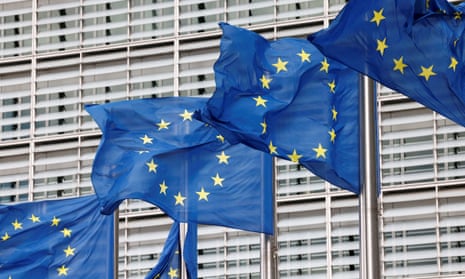The European Union could use development aid, trade policy and access to visas as “leverage” over non-EU countries that are deemed to be failing to take back their citizens denied the right to stay in Europe, according to a draft communique seen by the Guardian.
The EU’s 27 national leaders could endorse a plan at a summit in Brussels next month to use “all relevant EU policies, instruments and tools, including development, trade and visas as well as opportunities for legal migration” as “leverage” over migrants’ countries of origin.
The draft reflects growing momentum to get tougher with non-EU governments – usually in the Middle East, Africa or Asia – who are deemed unhelpful in taking back their citizens denied the right to stay in Europe. In the first half of 2022, 179,600 people were ordered to leave an EU member state, but only 33,600 returned to their country of origin, a return rate of just 19%.
The EU has long struggled to return people denied the right to stay back to their home countries. Improving the return rate is a top priority for European interior ministers, meeting in Stockholm on Thursday, where they will discuss a proposed sweeping overhaul of the bloc’s asylum and migration policies.
The move to a tougher policy is likely to be welcomed by many EU capitals that have faced a rise in people arriving as irregular migrants via land and sea crossings. In 2022, 159,410 people arrived in Europe via different Mediterranean routes, the highest number since 2017, according to the UN refugee agency. The agency reported that 1,953 people died or went missing that year in their attempt to reach Europe.
But the approach has rung alarm bells for anti-poverty campaigners and is likely to face criticism in the European parliament.
Evelien van Roemburg, head of Oxfam’s EU office, said the approach failed “to put human rights first, as it treats people as pawns in EU trade negotiations and development policy”.
She went on: “The EU’s obsessive focus on externalising their migration responsibilities is not in line with their continued statements of equal partnership with non-EU countries. Instead, the EU bullies them into meeting their narrow-minded political objectives.”
“Aid is meant to assist people to get out of poverty not to stop migration.”
The EU is the world’s largest donor of development aid and the leaked paper does not spell out how such funds could be linked to compliance with its returns objectives.
The Netherlands, a destination country for many who arrive in Italy or Greece, this week called on the European Commission to come up with proposals to use trade, visas, development policy, as well as test out legal ways for people to come to Europe for a temporary period, to decrease irregular migration and promote returns.
Sweden, which took more refugees per capita than any other EU member state during the migration crisis of 2015, is also calling for a similar approach when it comes to people denied the right to remain. “Haven’t we come to a time where we need to use both the carrots and the sticks a bit more efficiently than we have so far,” Sweden’s EU ambassador, Lars Danielsson, said to reporters earlier this month, as his country began a six-month stint chairing the EU council’s rotating presidency.






